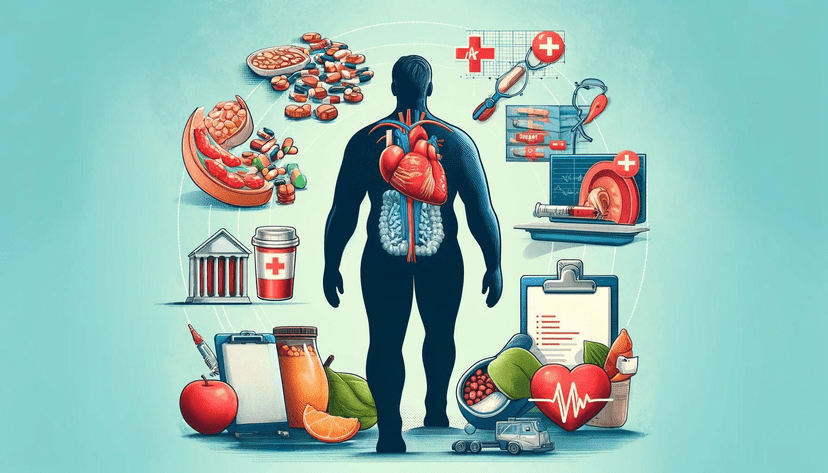Navigating dietary needs: A decade post-surgery

Reflecting on the Journey: Changes Over a Decade
Embarking on the transformative journey that commences immediately after weight loss surgery, it's vital to understand that this isn't simply a physical journey. Often under-discussed, but equally salient, it is a journey of education and adaptability, involving significant shifts in your dietary needs.
Early Post-Surgery Dietary Adjustments
In the immediate post-operative phase, your body is in recovery mode, and you may experience a variety of physiological changes. Your commitment to a new nutritional regimen is crucial at this stage. Here are several notable modifications:
Moving from a liquid to a solid diet: Deconstruction of your old dietary habits begins immediately after surgery. Starting with a strictly controlled liquid diet, including protein supplements and clear broths, you move gradually towards consuming pureed foods and later, solid foods - a process that might span several weeks.
Portion size and meal frequency: An essential shift is adjusting to the small stomach's demands, which requires smaller, more frequent meals. The focus should be on high-quality, nutrient-dense food, ensuring you meet your nutritional requirements while adhering to the reduced volume intake.
Mid-Term Changes and Evolving Nutritional Needs
As you track further from the initial post-surgery phase, sustainability becomes key. Your dietary needs continue to evolve, fueled by improving physical health and developing tolerance to a wider variety of foods. It's essential to remain cognizant of these ongoing changes and adapt proactively.
Micronutrient supplementation: Often, the reduced intake associated with a smaller stomach can predispose you to deficiencies in micronutrients like iron, calcium, and vitamins. Therefore, long-term supplement use is often necessary to ensure you meet the recommended dietary allowances.
Adapting to physical activity: With an improving health profile, physical activity levels typically increase. It's essential to complement this with changes in macronutrient intake, paying particular attention to protein and carbohydrates that provide the necessary energy for your activities.
The Importance of Continued Nutritional Vigilance
As you cross the milestone of a decade post-surgery, your journey is far from over. In fact, it's crucial to exercise unwavering commitment to nutritional vigilance. With every passing year, the risk of slipping back into old dietary habits increases.
Regular health check-ups: Regular health checks and consultations with nutrition professionals can help monitor your health status and dietary needs. They can provide tailored advice and help identify and mitigate any arising nutritional gaps.
Continuous education: As science evolves, so does our understanding of nutritional needs. Therefore, continuous learning is crucial. From understanding food labels to discerning fad diets, expanding your nutritional knowledge will help maintain good health and continue to benefit you, a decade, or multiples thereof, after surgery.
Emphasis on mental health: Recognizing that this journey isn't merely physically taxing but also mentally is vital. You might consider seeking professional guidance to cope with the psychological elements of this life-changing journey, ensuring you maintain a positive outlook and continued commitment to your health.
Remember, achieving and maintaining weight loss post-surgery isn't a destination but a continuous journey that demands adaptability, commitment, and evolving nutritional knowledge. The journey so far has been transformative – and now, with a decade under your belt, you’re well equipped to continue in good health.
Long-Term Nutritional Challenges and Solutions
When a decade or more has passed following a weight loss surgery, the body has largely adapted to the significant physical changes. However, long-term challenges often arise in terms of nutrition. Post-surgery diets demand a serious commitment to maintain and this lifestyle shift can become more challenging as the years pass by. There could be potential for micronutrient deficiencies, certain changes in metabolism, and the need for continuous adjustment to the body's adaptation to the surgery. This section will address these specific challenges and provide some practical solutions for managing them.
Identifying and Managing Micronutrient Deficiencies
Micronutrients play a key role in ensuring overall health and wellbeing. These include essential vitamins and minerals required by the body, many of which cannot be produced by the body itself. Post-surgery, the absorption of micronutrients can be compromised and this can potentially lead to deficiencies.
Common micronutrient deficiencies after weight loss surgery can be in Vitamins A, D, B1, B12, and K, iron, calcium, and zinc. Symptoms can vary significantly ranging from fatigue and dizziness to hair loss and impaired immunity.
Combatting micronutrient deficiencies requires measures such as:
- Including a diverse range of fruits, vegetables, lean proteins, and whole grains in the diet.
- Regular blood tests to monitor nutrient levels.
- Dietary supplementation, often under the guidance of a healthcare provider since over-supplementation can also lead to health issues.
Adjusting to Metabolic Changes Over Time
Your metabolism undergoes substantial changes after weight loss surgery. While initial rapid weight loss following the surgery is largely due to reduced calorie intake, over time, metabolic changes also contribute. As the body adapts to fewer calories, it becomes more efficient in using them, potentially leading to weight stagnation or gain.
A few strategies to deal with these changes include:
- Regular and varied physical activity can help increase metabolic rate and offset some of the efficiency.
- Consuming adequate protein can help to maintain lean muscle mass, thus avoiding metabolic slowdown.
- Managing stress and ensuring adequate sleep as both play a significant role in metabolic health.
The Role of Regular Medical and Nutritional Consultations
Regular medical consultations are crucial in the long-term management post weight loss surgery. Diagnosis of potential nutrient deficiencies, changes in metabolism, and other nutritional challenges becomes feasible through these check-ups. A healthcare provider can also help tailor a diet plan and exercise regime specific to individual needs.
Nutritionists or dietitians also play a major role in sustaining the long-term results of the surgery. Professional guidance can help in planning meals that are nutrient-rich and balanced.
Regular health screenings, professional consultation, and tailoring of diet plans to current metabolic and health conditions are an integral part of post-surgery life a decade or more after the event. Managing nutrition is not just about maintaining the weight but also about ensuring holistic health and wellbeing.
Change is part of this journey. At times, it might feel challenging to keep up. But remember that in the face of these challenges, there exist solutions grounded in science, research, and practical evidence. Adopt them, adjust, and continue the journey towards healthier you.
Maintaining a Balanced Diet and Healthy Lifestyle
Achieving a healthy lifestyle and maintaining a balanced diet decades after surgery demands consistency, perseverance, and a good understanding of one's body nutritional needs. Leading a healthy lifestyle following surgery should ideally hinge on the integration of a variety of nutrient-dense foods, staying hydrated, practicing portion control, and engaging in regular physical activity. These practices aren't only fundamental to sustaining weight loss but also pivotal in fostering overall health.
Key Components of a Long-Term Healthy Diet
A balanced diet should consist of macronutrients (proteins, carbohydrates, and fats) and micronutrients (vitamins and minerals) in appropriate quantities. The foundation of a long-term healthy diet is variety. Your diet should comprise a wide range of nutrient-dense foods including:
- Fruits and vegetables: these are high in vitamins and minerals and low in calories which can aid in weight regulation.
- Whole grains: whole wheat, brown rice, oats, etc. are excellent sources of dietary fiber.
- Lean proteins: Proteins aid in muscle repair and growth. Aim to include lean meats, poultry, fish, eggs, legumes and nuts in your meals.
- Hydrate and limit high-fat and high-sugar foods: staying hydrated is crucial for overall health. Limit foods and drinks high in sugar and unhealthy fats.
Experience has shown that individuals who manage to implement a balanced dietary plan over the long term generally experience better post-surgery recovery, stabilized body weight, improved immune function, and overall wellness.
Staying Hydrated and Practicing Portion Control
A critical aspect of maintaining a healthy diet post-surgery is to ensure sufficient hydration and regulate portion sizes. Hydration is crucial for various physiological functions, including transportation of nutrients, temperature regulation, and digestion. Aim to drink at least 2 liters of water every day.
Portion control is essential, mainly when portion sizes tend to be oversized. Correct portion sizes prevent unnecessary weight gain and help you meet your daily nutritional needs. To practice portion control, consider using smaller plates, eating in a non-distractible environment, eating slowly, and making sure half of your plate is filled with vegetables or salads.
The Importance of Regular Physical Activity
Physical activity is an integral aspect of maintaining weight loss and overall health. Regular exercise helps burn calories, strengthen muscles and bones, enhance mood and energy levels, and reduce the risk of chronic diseases. It’s recommended to aim for at least 150 minutes of moderate-intensity physical activity per week.
Remember, it's not about becoming a marathon runner overnight; it's about incorporating physical activity into your daily routine in a sustainable way. You should aim to find a form of workout activity you enjoy and that suits your post-surgery status. Walking, gardening, swimming, cycling can all be a beneficial part of your post-surgery active lifestyle.
In conclusion, a decade after surgery, maintaining a balanced diet and leading a healthy lifestyle involves consuming a variety of nutrient-dense foods, staying hydrated, practicing portion control, and engaging in regular physical activity. By integrating these habits into your life, you can ensure a more successful recovery and a healthier life post-surgery.
In Summary
To recap, this blog post sheds light on a crucial yet often unexplored part of the weight loss surgery journey: nutrition and lifestyle changes both immediately post-surgery and a decade or more down the line. It highlighted the crucial role of gradual dietary adjustments, dietary supplementation, and adaptation to increased physical activity during the early post-surgery phase.
Another critical aspect covered here is the significance of micronutrient supplementation, dealing with metabolism changes, and the importance of regular health checks during the longer-term post-surgery phase, even a decade later.
The blog post also delved into post-surgery challenges such as potential micronutrient deficiencies, changes in metabolism, and the need for continuous monitoring and adjustment to the body's adaptation to surgery. Solutions were proposed to these challenges, including balanced diet planning, regular health screenings, and dietary supplementation.
The final part of the blog post emphasized the importance of maintaining a balanced diet and healthy lifestyle involving a well-rounded, nutrient-dense diet, staying hydrated, practicing portion control, and regular physical activity.
In implementing this knowledge, here's a suggested action plan to follow:
- Refine your dietary habits gradually: Start by embracing nutrient-dense and portion-controlled meals. Over time, widen your diet to include solid foods.
- Engage in regular physical activity: Find a form of workout that you enjoy and suits your post-surgery status.
- Monitor micronutrient levels: Regularly check your levels for potential deficiencies and supplement your diet under the guidance of healthcare professionals as needed.
- Stay hydrated: Make an effort to drink at least 2 liters of water daily.
- Commit to long-term nutritional vigilance: Keep up with regular health screenings and consultations with nutrition professionals.
- Nurture your mental health: Considering the psychological impact of this transformation, seek professional guidance as necessary.
Remember that it is a journey of consistency, education, adaptability, and commitment. By following these steps, you can successfully navigate the challenging yet rewarding journey of post-surgery transformation.





